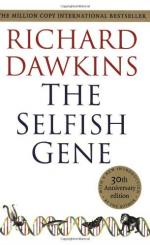
|
| Name: _________________________ | Period: ___________________ |
This quiz consists of 5 multiple choice and 5 short answer questions through Chapter 8.
Multiple Choice Questions
1. How common are genes that cause altruistic behaviors in nature?
(a) They are pretty common.
(b) They are extremely rare.
(c) They are vast majority of genes.
(d) They are nonexistent.
2. What does Dawkins say removes humanity from the cruel and harsh laws of nature?
(a) Humans create environments that protect them from natural laws.
(b) Humans teach children ways to behave and learn better behaviors as adults.
(c) Nothing.
(d) Humans have developed genes for communication, which allows cooperation.
3. What does the study of egg clutch sizes that Dawkins cites show?
(a) That there are only detriments to having a lot of eggs.
(b) That there are only benefits to having a lot of eggs.
(c) That having a lot of eggs is, in the end, exactly the same as having few eggs.
(d) That there are detriments and benefits to having a lot of eggs.
4. What does Dawkins cite Medawar's study to help explain?
(a) Male fertility.
(b) Menstrual cycles.
(c) Menopause.
(d) Male and female hormonal differences.
5. What does Dawkins say points to the idea that all living things come from the same types of early molecules?
(a) All life forms are based on carbon.
(b) All life forms have similar pH balances.
(c) All life forms have basic cell structures.
(d) All life forms are made from DNA molecules.
Short Answer Questions
1. What does Dawkins believe about the tension between survival of different generations?
2. Why does the author use the word "apparently" to describe selfish or unselfish behavior?
3. According to Dawkins, for whom does a bird regulate the number of eggs it lays?
4. How does Dawkins argue for communication being selfish?
5. In Dawkins' example, why might an older child give up food for a younger sibling?
|
This section contains 481 words (approx. 2 pages at 300 words per page) |

|




